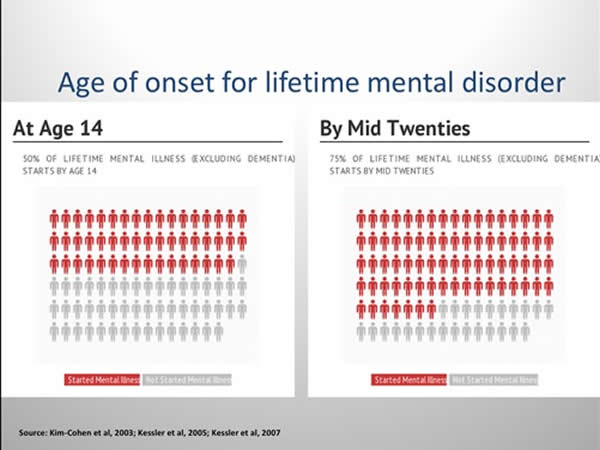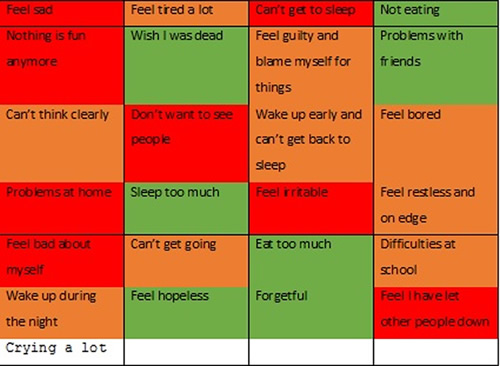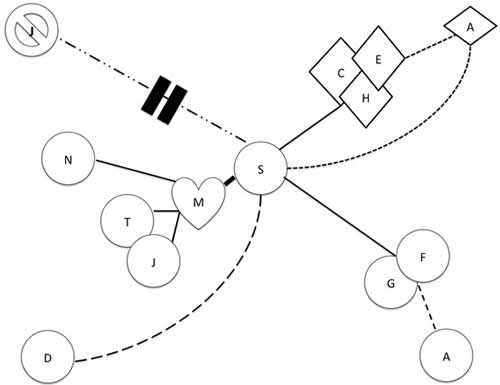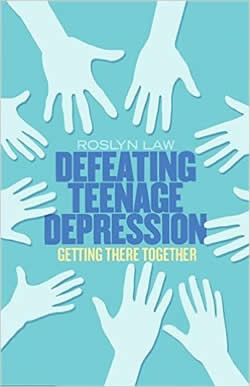Positive Health Online
Your Country

Defeating Teenage Depression - Getting There Together
listed in depression, originally published in issue 234 - November 2016
Depression during adolescence is a significant public health issue, the impact of which is felt by young people and their families for months and sometimes years. It destabilizes life at home, at school and with friends and interrupts a significant period of brain development. Depression is twice as common in adolescents as it is in younger children and is a significant predictor of the likelihood of becoming depressed again as an adult. 50% of all lifetime mental illness starts by age 14 and 75% starts by mid-twenties. While the majority of adolescents with depression do recover, the challenge for mental health professionals working with young people is to help them to do that as quickly as possible.

Despite the need for effective treatments, studies have shown that the majority of young people receiving ‘usual care’ in community services did not show clinical improvement and remission rates in community services for young people receiving the best treatment remains at 30-50%. NICE guidelines recommend three psychological therapies to treat an episode of moderate to severe depression during adolescence: Cognitive Behavioural Therapy (CBT), Interpersonal Psychotherapy for Adolescents (IPT-A) and Psychodynamic Psychotherapy. Recent reviews and meta-analyses identify CBT and IPT-A as the two most efficacious evidence-based treatments for this condition (Zhou et al 2015).
Improving access to these evidence based treatments for young people with mental health problems is a core principle of the Children and Young People’s Improving Access to Psychological Therapies (CYP IAPT) programme in England. Over the last five years, hundreds of therapists across the country have been trained in a range of evidence based approaches for common mental health problems, such as depression and anxiety.
Interpersonal Psychotherapy for Adolescents (IPT-A) is relatively new as a treatment for depression in adolescence in the UK, but is becoming more widely used because of its successful focus on the relationship issues that are so common for young people with depression. IPT-A helps to sort out the inevitable problems that develop with other people when young people are depressed. The basic aim is to help young people to understand how depression and problems with other people are connected and to disentangle them through better self and other-awareness and communication. This approach is the focus of a newly published book called Defeating Teenage Depression - Getting There Together, which offers step by step guidance for young people, their families and therapists on how to use this effective treatment.
The Focus of IPT-A
IPT-A is organized around four main interpersonal problem areas, which capture common problems for many young people with depression. Often these themes overlap in a young person’s experience, but rather than trying to tackle everything at once and risk feeling overwhelmed, IPT-A helps to prioritize one problem area, in the knowledge than sorting out one part of the puzzle often indirectly helps other areas of life too. The four IPT-A problem areas are:
- Adjusting to important change you are unhappy about e.g. families splitting up, breaking up with a boyfriend or girlfriend, changing schools and adjusting to a physical health problem;
- Not getting on with someone who is important in your life e.g. fights with parents, friends or the person you are dating. It can also include not talking to someone close to you, like a brother or sister;
- When someone close dies e.g. a parent or grandparent or friend dying;
- When it is difficult to make or keep friend e.g. not having many friends, finding it difficult to talk to other people or falling out with people again and again.

Colour Coded Symptom Wall
Unlike some other psychological therapies, IPT-A explicitly conceptualizes depression as an illness that requires treatment. The initial sessions of IPT-A involve making a detailed assessment of current symptoms and agreeing an explicit and informed diagnosis.
In order to decide which problem area is best to focus on in IPT-A, the young person is supported to become an expert in his or her own depression and to trace the impact of the symptoms in their current relationships. Alongside knowing about common experiences of depression, it is important for young people to identify the specifics of their own personal experience. Early in the process they are invited to visually depict their symptoms of depression by colour coding a ‘symptom wall’, as illustrated above. A traffic light system is used to create a picture of the young person’s experience of depression. Red, amber and green are used to show the significance of each symptom. Focusing on the preceding two weeks, red marks the symptoms that bother the young person most, amber marks those that bother the young person some of the time and green marks those that don’t bother the young person much or at all. Space is also left for the young person to add details not included in the list.
The wall is updated at regular intervals during therapy to track the progress that is being made and identify areas for additional targetted attention.
IPT-A takes a ‘no blame’ approach: depression is real, not the young person’s fault and has consequences in a number of areas of life, including with family and friends and at school.

How Relationships are Mapped Out
Lots of young people who have depression know that help is available but struggle to engage with it. IPT-A helps young people to let others know how they feel to invite others' help when it is hard to help themselves. A visual inventory of current relationships is created to identify the young person’s ‘team’ as well as those relationships that will be the focus of interpersonal problem solving in subsequent sessions. In order to promote this self-awareness and identify the value of sharing how they feel with others, young people are invited to watch a range of short videos of other young people talking about their experience of depression and accessing help e.g. via www.bbc.co.uk/education/clips/zxqcd2p. This aims to reduce the young person’s sense of isolation in the experiencing depression and instilling hope in recovery through a team effort.
When the focal area has been agreed, the young person and therapist agree to work towards a small number of interpersonally framed goals that will contribute to resolving the main difficulties they have identified e.g. develop skills in talking about how I feel when I am upset; spend time with my close friends at least twice a week. Symptoms are tracked each week and the young person is helped understand the nature of the problem they are having with other people and the role depression plays in those difficulties. They are then helped to communicate their needs and feelings more clearly and effectively and enlist the support of the people around them to resolve current difficulties.
To illustrate this approach, we will look at Callum’s story.
IPT-A Starts by Gathering the Depression Story and Identifying Key People
In the initial sessions of IPT-A Callum was invited to tell his story and helped to identify the ways in which depression had influenced its course. He has been feeling down and irritable for about a year, but he had also started to feel tired, unsure of himself and hopeless in recent months, after he moved from his mum’s house to go and live with his dad and his new wife. The move was Callum’s idea, even though he had never been very close to his dad. After months of turmoil at his mum's he felt he had no choice. Around the time he started to feel down and irritable his mum’s new partner, Mike, had moved in. He and Callum did not get on at all. Mike had been in the army and was very strict. Callum resented someone appearing in his house and trying to take over. He and Mike argued daily and Callum felt bullied and criticized all the time. He felt trapped, upset and angry and as the weeks went on he spent more and more time alone in his bedroom to avoid Mike. This also meant he spent less with his mum, which was an important change because they used to be very close and he missed her. At the same time he he felt angry that she wasn’t standing up for him. During one particularly bad argument Callum felt afraid that Mike was going to hit him because he was so angry. He called his dad that night and told him he wanted to go and live with him. He didn’t tell either of his parents what was behind this request and within two weeks he had moved over an hour away from his mum and his friends, but most importantly, he thought, from Mike.
IPT-A Focuses on One Main Interpersonal Theme - in this Case a Significant Change
In IPT-A Callum and his therapist agreed to focus on the big change that had happened in his life around the time he started to feel depressed. He was encouraged to talk about what he felt he had lost from his old life and what opportunities he could see in his current situation. He felt torn between missing life with his mum before Mike and feeling awkward and unsure about his life in his dad’s house. He described liking living with his mum when it was just the two of them. They got on well most of the time, she liked his friends and hardly ever complained when they had band practice in the garage. Callum felt very hurt that she made almost no effort to see or speak to him in the weeks after he moved out and that reinforced his view that that she didn’t need him now Mike was around. In contrast to these good memories, Callum felt like a stranger in his dad’s house. His dad was a quiet, gentle man and helped him in practical ways, but they had never been very close or talked about feelings and problems. Callum was pleased that he wasn't as scared as he had been when he lived with mum and Mike, but the sudden move didn’t feel like it has solved all of his problems either and it was lonelier than he expected. He stayed in his bedroom as much as he did at his mum’s and wondered if he had done the right thing moving to live with dad. When he moved, he started attending a new sixth form college and this made him feel even more lonely. He didn’t have the interest or energy to make new friends and his own friends now lived over an hour away, so he almost never saw them.
IPT-A Explores Affect and Communication
As the IPT-A session continued Callum was asked to describe how he felt about the people around him and to think about how well they understood each other. Callum and his therapist carefully reconstructed important conversations and thought about what had and also what hadn't been spoken about with the important people in his life. He realized that he missed his mum but he was also angry with her. He used to find it easy to talk to her but they haven’t done that since soon after Mike moved in. Callum remembered that he used to find it easier to think about things after he had spoken to his mum and recognized he had no-one to do that with anymore. He also missed his three friends from school. They used to hang out a lot, played music, went to gigs together and had a laugh. They used to help when he got stressed about Mike complaining and criticising him. They would make him laugh with stories of stupid things their parents said and when they did that Callum didn’t feel so bad for a while. Callum also remembered that he had thought Mike was OK at first but he didn’t know how to handle it when Callum spoke back to him and that's when he started trying to put Callum in his place. Callum hated that and it made him talk back more, just to wind Mike up. Mum used to say they were as bad as each other and refused to get involved, which infuriated Callum. For the first few months Callum hoped Mike would just leave but then felt increasingly hopeless when it became obvious he wasn't going to.
Callum’s friends from school made a lot of effort to keep in touch with him and sent text messages and videos of them playing in the band, saying it wasn’t the same without him. At first he didn’t answer the messages, but gradually he started sending ideas for music back to them and they wrote a couple of songs together by sending messages and recordings back and forth. When Callum told his dad about the song he was writing he offered to drive Callum over to see his friends if he wanted to try the songs out in person. His dad had noticed that Callum seemed a bit happier after he started playing his guitar again and he thought it might help. Callum expected to feel awkward when he saw his friends again and worried that he’d have nothing to talk about because he hadn’t been going out or doing anything. In fact, they had already started playing when he got there so he just joined in like he used to do and his anxieties soon faded away. After that his dad took him over to see his friends every couple of weeks and when he said they could use his garage to practise his friends took turns and travelled to Callum every other week.
Building Bridges Between Past and Present
The focus on communication in IPT-A aims to resolve the central difficulties that have been identified in important relationships and using the support of team members to try out new strategies. After he had visited his friends a few times Callum’s therapist asked about the possibility of visiting his mum when he was next there. Callum wasn’t keen at first because he hadn’t been back to her house for almost three months and had only spoken to her a couple of times. He was encouraged to think about the possibilities and difficulties in this idea and to discuss it with the people on his team. He chose to speak to his step mum and she asked him to tell her about what had been so difficult at home. This was the first time anyone outside of therapy had asked him and he was surprised to feel relieved when he started talking about what had happened. His step mum helped him to think about how difficult it had been for Callum and Mike to adjust to living in the same house and encouraged him to talk it over with his mum next time they spoke. With the help of his step mum and IPT-A therapist, Callum thought about what he wanted his mum to know e.g. that he was hurt and felt let down by her but that he also missed her, and how he might say this to her. Callum used these ideas to ask his mum if they could meet her without Mike being around. His mum agreed and in the weeks that followed they started to meet and talk more regularly and Callum explained how he had felt and began to understand how difficult his mum had found the fights he had had with Mike and how frightened she was that he wouldn’t wanted to see her again after he moved out.
Who can Support You?
Throughout IPT-A there is constant attention on how to use the various types of support that the people around the young person can offer. Callum had very little support when his life at home changed and this made It much harder to cope and adjust. He withdrew from his friends and family when the fights with Mike got worse and he had no one to help him make sense of what was happening or how he might try to cope. He resented Mike for coming into his home and felt like he had lost his mum when she didn’t stand up for him. When he moved to his dad’s house he was much further away from his friends and found it very difficult to make new friends at college because he was feeling so low. His dad did what he was best at when he offered to give him practical help by driving him to see his friends and offering to let them use his garage. This was important because it meant Callum could start enjoying friendly company again, which he hadn’t done for a long time. That company lifted his mood enough for him to confide in his step mum for the first time. When he was feeling so low Callum hadn’t thought of talking to her because depression had interfered with his ability to problem solve and come up with new ideas. Starting to talk about how he felt and having her support to talk to his mum again left him feeling much less alone and frightened.
When Callum’s friends came to see him they started going out more after band practice and discovered places they could listen to music and see local bands that Callum hadn’t known anything about. Sometimes students from his college were there too and this helped him to get to know them, which made going to college much easier and more social. When his mood improved Callum found his new courses much more interesting and he started taking advantage of all of the extra activities that college had to offer. This helped Callum to have more of a local friendship group as well as staying in touch with the good friends who had stood by him when he was so low. He arranged to see his mum every couple of weeks and they arranged to do things for just the two of them each time he visited. After a few of these visits he sometimes stayed at his mum’s house for the weekend and this meant he would see Mike. Callum found it much easier to manage these visits because he didn’t have to live with Mike and his mum was much better at stepping in if Mike started to criticise or if Callum tried to wind him up, which he still liked to do sometimes. By the end of IPT-A Callum was doing well at college and had applied to go to University at the end of the year, which would mean moving again but he was excited about that change and was ready to make the most of it.
Reference
Zhou X, Hetrick SE, Cuijpers P, Qin B, Barth J, Whittington CJ, Cohen D, Del Giovane C, Liu Y, Michael KD, Zhang Y, Weisz JR, Xie P. Comparative efficacy and acceptability of psychotherapies for depression in children and adolescents: a systematic review and network meta-analysis. World Psychiatry 14 207-222. 2015.
Further Information
For more information on IPT-A:
Law, R. Defeating Teenage Depression – Getting There Together. Available from Little Brown Books, London. 2016.
Comments:
-
No Article Comments available
